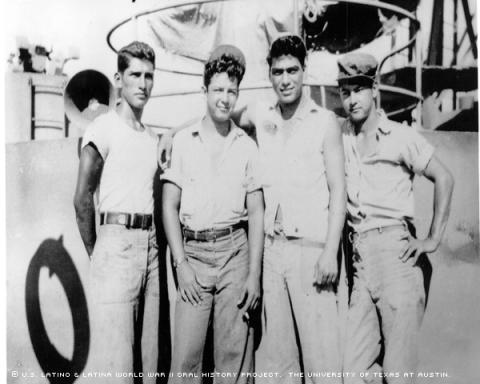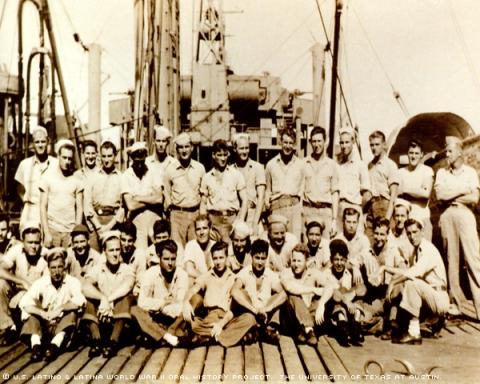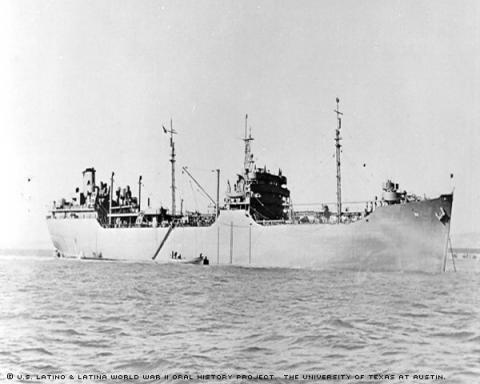


By Rhonda Miller
World War II veteran Raymond Sanchez went bird hunting once with a Navy buddy in South Texas. The two friends, both Latinos, decided to stop for a beer at a little tavern on Highway 72 between Kennedy and Three Rivers.
"We came to this shed outside and all the Hispanics or Mexican Americans were drinking outside," Sanchez said. "I says, 'Hey man, it's September and it's hot, why don't we go inside?'
“He says, 'Raymond, we can't,' and I asked, 'Why?'
“He says, 'It's just the way it is, you know.'"
Sanchez asked his buddy who the owner was and found out the owner had been a prisoner of war at Camp Wallace and chose to stay in America.
"So I went in. I said, 'Come on, let's go.'
“He said, 'Raymond, please don't start any trouble.'
“I sat down and the guy said, 'Yes Mister.'"
"I said, 'Look man, I don't care what brand it is, just give me the coldest beer you got.'
“And ever since, they've been serving us."
Sanchez is proud of his Mexican American heritage. He and his wife have taught their children to be proud of who they are and to always pronounce their last name correctly.
"Sahn-chez, not San-chase," he said.
"I always made it a point. I says, ‘Wherever you go, if they ask you what you are, tell 'em you're a Mexican American and don't be ashamed."
At the time of Sanchez’s interview, the easygoing shoe-store owner hadn’t lost any of his spunk and was still working.
Raymond's Workshoes Store is tucked inside a strip shopping center on South Lamar in Austin. Sanchez has been serving customers at this location for 11 years, but says he has been in the business 53 years. Jane, his wife of 50 years, has been working beside him since their three children grew up and left home.
Born in 1926, Sanchez has spent most of his life in Austin. One exception was when he was 6 and went to live with his grandparents in Kyle, a small rural town about 20 miles south of Austin.
"When you're the first grandchild, usually among Mexican American families, the grandparents want you," he said.
Sanchez attended school in a three-room building with other Mexican American children, while the Anglo children attended school downtown. When Sanchez was 10 or 11, he worked part time in a general store in Kyle. He said farmers and ranchers would come in once a month to buy provisions.
Sanchez remembers big barrels full of mint candy. After the customers made their purchases, it was his job to scoop and sack the candy as a freebee ("[de] pilon," or "gratis") for the customers.
Sanchez returned to Austin when he was around 12. He attended Bickler School until 1937; then transferred to Palm school when it was integrated.
"Bickler was located on the corner of 11th and East Avenue, which is where the Marriott Hotel is today," Sanchez said.
His father was a tailor and his mother a housewife. As one of eight children, money was tight and Sanchez soon gained his first experience in the shoe business.
"I started out as a shoeshine boy," Sanchez said. "We worked up and down Sixth Street shining shoes for many, many evenings."
At one time, he worked at Chico Shoeshine Parlor on East Sixth Street. It was one of the biggest shoeshine parlors in Austin.
"I use to get out of school and I'd go to a used shoe store and shine a shoe for a penny a shoe, and I'd shine 24 pair, you know, for a penny a shoe. It was a lot of money back then." Sanchez recalled.
He worked at a kosher meat market from 1939 until July of 1943, until he dropped out of high school to join the Navy. Patriotism played a large part in his joining, but so did economics.
"It was hard times, we were just coming out of the depression," Sanchez said. He made $98 a month in combat pay and he sent all but $8 to his family.
He came home after the war and, at the age of 21, went back to high school.
"At first I thought it would be bad, but I wasn't the only veteran there," Sanchez said. "We had a veterans club there at Austin High."
Sanchez worked part-time at the Austin Army Navy Store as a janitor while he finished high school. Within a few months, he was promoted to the shoe department; after graduation, his boss convinced him to stay.
"When I graduated, I told my boss I was quitting, and he was paying me $35 at the time, in 1949, and he asked me what was I going to major in at the university, and I thought I'd be a smart aleck and I said business administration," Sanchez recalled.
"'Raymond, effective Monday you're making $75 a week,' and he pointed at me, 'And I'm going to teach you all there is to know about business right here.'
“I stayed with the man 30 years," Sanchez said.
He became a shoe buyer for the store and traveled to Dallas with his boss twice a year to purchase shoes. Once a year, they went to El Paso, Texas, to buy cowboy boots at the Tony Lama Boot Company.
Sanchez also traveled the rodeo circuit for the store: They sponsored youth rodeos and stock shows. Sanchez witnessed discrimination against Mexican Americans in the small towns. Because he could speak German and Yiddish, which he learned working in the kosher meat market, he said he felt people weren’t sure what race he was.
"I never had any problems -- but I seen it there, you know. I ate in the restaurants just like the rest of the [Anglo] people," he said.
"However, our group of men that served in the Navy, we didn't know what discrimination was. Everybody was equal.”
Petty Officer 3rd Class Sanchez was with the 2nd Division and served on board the U.S.S. Saranac, a Navy fleet oiler, which carried more than a million gallons of fuel, including diesel oil, fuel oils, high-octane gasoline, aviation gas and ammunition. Their job was to supply aircraft carriers, destroyers, minesweepers and other types of ships.
"Our ship got hit and we lost quite a few men," Sanchez said. "Two of us got wounded but we refused to go home. We decided to stay and keep on going."
Sanchez developed lifelong friendships with three other Texans: Herby Gonzalez and Henry Almaguar from San Antonio and Armando Hinajosa from Karnes City, Mo. All four served together on the Saranac.
Over the last 50 years, the buddies and their wives stayed close friends. They never lost contact with each other and there were never any misunderstandings between families.
"Every time they had a child we'd all meet, every time there was a baptism we would all meet, graduation, you name it," Sanchez said.
He remembers when the four buddies were in Manila, on liberty. They were walking down a main street and were surprised to hear The Beer Barrel Polka in Spanish.
"We all had nicknames. They called me the ‘horse' because I was always working," said Sanchez with a laugh as he explained how Armando got his nickname:
"When we first got on board ship, we were deck apes. We use’ to chip decks, paint decks and chip walls and bulkheads, as they call them in the Navy," Sanchez said. "We were in a circle and the chief petty officer said, 'Hey, peanut, come up here.' And he's the one that got up. That's how he got ‘is nickname Peanut."
Armando and Herby are now deceased.
The group of men stayed in contact with each other through reunions. Five years after the war, they had their first gathering, and for the last 10 years they’ve been meeting every year.
"The guys that are deceased, their wives show up and represent them. If it's not a wife, it's a daughter or a son," Sanchez said.
Sanchez and his wife, Jane G. Sanchez, have traveled all over the U.S. attending reunions. The next gathering will be in Gettysburg, Pa., in October of 2000, at which point they’ll take time off of work to enjoy friendships and memories of a lifetime.
Unfortunately, memories aren't always pleasant.
"I was a signalman aboard ship and my job was to receive signals from other ships," Sanchez recalled. "But when you're on board ship, we have a combat station, and my combat station was on the 40 mm mount anti-aircraft. I was first loader."
Sanchez was on the Saranac in Tokyo Bay during the signing of the Japanese surrender to allied powers, which took place on the U. S. S. Missouri.
"We were also there [in Okinawa] when they dropped the atomic bomb on Japan," he said. "We dropped it twice and you can't imagine the devastation it brought on."
Jane said family and friends were proud of her husband serving in the military, and that several of his friends threw welcome home parties upon his return to Austin.
After the war, Sanchez spent many years serving his community: He worked with the Century Club to get the Cantu/Pan American Recreation Center on East Third Street built, as well as helped get the fence installed in Zaragosa Park on Gonzalez Street. He also worked with juveniles under the Distributive Education Program, helping dropouts through civic organizations such as the Century Club.
After Sanchez had children (Michael, Patti and Janet), he devoted time to their activities as well. When his children were in school, he coached baseball, volleyball and basketball. Michael played football, and Sanchez and Jane went to all of the games.
Sanchez underwent triple heart bypass surgery in 1991, and his children helped him out. Patti and Michael took five-week leaves of absence from their jobs to help their mother run the shoe store.
"My kids, they think I am a giant and I am only 5' 7”," he said.
Sanchez has never let a challenge stand in his way.
He recalled an embarrassing incident in school as a child: It was in English class; the students read aloud. He said his accent was bad, and the teacher told the class, “These Mexican children will never learn.
"So I use’ to go home in the evenings and get in front of a mirror and read aloud," Sanchez said.
He believes cultural differences are what cause many of the problems between races. Sanchez remembers taking tortillas to school as a child.
"My mother use’ to give me three little tacos with beans to take for lunch and we were embarrassed to eat in the lunchroom," he said.
The children would take their tacos out near the creek and eat; however, the Anglo children began buying the tacos for a nickel apiece, allowing the Mexican American children to buy lunches in the cafeteria.
Sanchez remembers when everyone on East Avenue between Sixth Street and 11th Street knew each other.
"People use’ to come out in the evenings, because from 15th Street all the way to First Street was nothing but parks -- beautifully decorated parks, a lot of flowers. People use’ to come out in the evenings and bring their children, and we'd all meet and nobody knew what it was to be black or white, and it was great," he said.
At the time of his interview, Sanchez was serving third- and fourth-generation customers. Many of his customers followed him from the Austin Army Navy Store. When asked about retirement, he said, "What's that? I am too young to retire."
The shoes are lined neatly in boxes against his store’s walls.
"The most popular Red Wing boot that we have, that we sold in 1946, when I started selling that boot, sold for $12.95. Today it sells for $158 dollars, same boot," Sanchez said. "It's never changed in quality or style."
Sanchez retired in 2005. On Feb. 19, 2005, he and Jane celebrated their 56th anniversary.
"What a blessing," he said of his marriage with "the love of [his] life. … It was worth [the] fight."
Mr. Sanchez was interviewed in Austin, Texas, on October 12, 1999, by Maggie Rivas Rodriguez.

